Media & Links
Here we provide information about publications, archives and institutions that offer information about the voyage of the Dunera, the internment in England and Australia and related topics. Over the course of the research for dunera.de, a small reference library has been created from which we present a few titles. These are non-fiction books and novels that have been published in German and/or English. Most of them are older publications; many titles are therefore only available second-hand or antiquarian.
Books in English Language
A group of historians from Melbourne’s Monash University are overseeing the Dunera Lives book project as a result of their many years of work on the history of internment in Australia, the artists among the Dunera Boys and the internees at Queen Mary. The first volume, subtitled A Visual History, was published in 2018. Here, the internment, the Dunera’s journey and the self-organised camp life of the internees are the backdrop against which an extensive body of visual art was created. The second book, Dunera Lives – Profiles, tells 19 biographies of former internees. These are introduced by biographical articles on Edward Broughton, the commander of the 8th Australian Employment Company, who was highly respected by the soldiers, and on Major Julian Layton, who handled the Australian camps for the British government. Both volumes are comprehensive and largely illustrated with colour illustrations.


Ken Inglis, Seumas Spark, Jay Winter u.a. Dunera Lives – A Visual History. Melbourne 2018. ISBN 978-1-925495-49-2.
Dunera Lives – Profiles. Melbourne 2020. ISBN 9781925835656.
In No One Knows Their Destiny, Tonia Eckfeld goes far beyond the experiences of her father Reinhold and her uncle Waldemar from the ‘Reichskristallnacht’ in Vienna to the end of the Second World War in Melbourne. Both were forced to leave their native Austria at the ages of 17 and 24 respectively, were unjustly imprisoned in England as ‘enemies’ and deported to Australia. Waldemar was the victim of an unpunished brutal assault by the guards at HMT Dunera. This determined the rest of his life.
Australian art historian Prof Tonia Eckfeld introduces the book with an extract (available in English for the first time) from Reinhold’s memoirs „Last Months in Vienna“, published in Austria in 2002. She supplements the life stories of his father and uncle with previously unpublished artworks, photographs and documents. She invites her readers to look at the Dunera Boys with new perspectives, recognising and considering the impact of war, trauma and legacy on families.

Tonia Eckfeld, No One Knows Their Destiny. The Eckfeld Records: Inside the Dunera Story. Monash University Publishing, Melbourne 9/2024, ISBN 9781922979780.
The Internment of Aliens is the very first book on British internment policy. As early as September 1940 the social scientist Francois Lafitte (1913-2002) published his investigation into the entire political environment in which the Churchill government declared 70,000 politically and racially persecuted people from Germany and Austria to be “enemy aliens” and “Hitler’s 5th column”. Lafitte proves this with many examples of Nazi opponents who were imprisoned or deported by the British. He also shows that the tribunals were used to specifically exclude Nazi opponents from the British public. “The British government has declared war on the wrong people” and jeopardized Britain’s reputation with this insult, Lafitte commented. The disregard for civil rights was “turning friends into enemies”.
“Anyone who commits or tolerates injustice is doing Goebbels’ work.” So Lafitte turned what was apparently a popular argument at the time against those who wanted to prevent criticism of the government. Despite the short time since the events, Lafitte researched the authorities, institutions, etc. One interesting piece of evidence for a persistent xenophobic mood in Britain towards the end of the First World War seems to be the fact that around half of those quoted wished to remain anonymous.
In five chapters, Lafitte not only deals with Britain’s treatment of the refugees and their situation as well as the prisoners of war. Eyewitness accounts of the sinking of the Arandora Star are also included. Naturally, however, the story of the Dunera is not included for reasons of topicality.

Francois Lafitte, The Interment of Aliens, pocket book, 256 pages. Penguin Special, 1940. A new edition was published in England in 2001, ISBN 478-1870352963.
Leni and Peter Gillman published a comprehensive review of British internment policy during the Second World War in 1980 under the title Collar the Lot! The events surrounding the Arandora Star and the Dunera play a central role in this collection of facts. The Gillmans also look at the background of political conflicts and contradictions. The wealth of documents and testimonies from internees make for a fascinating non-fiction book.
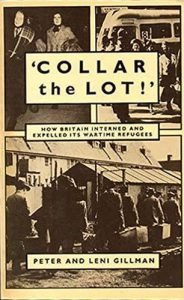
Peter and Leni Gillman Collar the Lot! How Britain Interned and Expelled its Wartime Refugees. London 1980, 334 pages. ISBN 0 7043 2244 7.
Among the non-fiction books about the Dunera, The Dunera Affair plays a special role. As early as 1990, Paul R. Bartrop and Gabrielle Eisen compiled around 400 pages of extensive material, which is quoted without comment. This includes official files as well as personal material such as extracts from diaries and memoirs. A short statistical appendix contains a compilation of the occupations of more than 1400 men, categorised by age. A valuable aid for historical research.
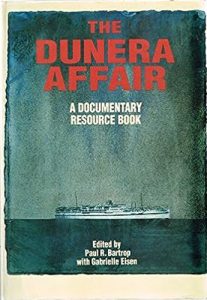
Paul R. Bartrop, Gabrielle Eisen, The Dunera Affair. A Documentary Ressource Book. Schwartz & Wilkinson, 1990: ISBN 1-56997-025-0.
The Dunera Scanal is a frequently quoted nonfictional book by Australian author Cyril Pearl, first published in Australia in 1983. It is a good source of quotes from official documents and statements by Dunera Boys, although unfortunately the author does not give any exact sources. However, the many poems and song lyrics written by Dunera Boys are an asset when reading the book.
Unfortunately, a few mistakes were made. Dunera Boy Walter Kaufmann criticized in the “Dunera News” (No. 12, page 19) false information about his person (page 36f.) and a quote from a Kaufmann book “The Turn of a Spiral”, which had never been published, at least until that Dunera Newsletter appeared in mid-1987. The information about Franz Lebrecht (not “Leberecht”, page 49) is completely wrong.

Cyril Pearl The Dunera Scandal, Angus & Robertson, Melbourne 1983, 234 p. ISBN 0-207-14707-8.
It was a long journey for Uwe Radok (1916 – 2009) before a lake in the Antarctic was named after the meteorologist and glaciologist, which took him and his brothers Jobst and Rainer from the East Prussian town of Königsberg and via deportation from England on the Arandora Star, whose sinking they survived. With 450 survivors, they found themselves on the Dunera just 10 days later and on their way to Australia.
Uwe Radok’s daughter Jacquie Houlden and Melbourne historian Seumas Spark publish extracts from Uwe’s diaries from June 1940 to February 1943, revealing his attempts not only to process and categorise the experience of exile, but also to overcome an identity crisis – a Shadowline.
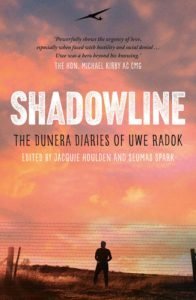
Jacquie Houlden, Seumas Spark (Übersetzungen Kate Garret), Shadowline. Monash University Publishing, Melbourne 2022: ISBN 978-1-92263-362-0.
In her native Australia, children’s author Claire Saxby is known for her picture books on historical themes. For her book on the Dunera theme, however, she found the form of a novel to be appropriate. In Haywire, Tom, the son of the baker’s family from the Australian internment village of Hay, meets Max, a deported German Jew of the same age. Different roots and shared experiences make the 14-year-olds friends. Saxby uses both the historical context of the “distant” war and authentic events in the Australian province.
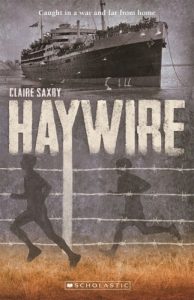
Claire Saxby, Haywire, Australien 2020, 240 pages, ISBN 9781942769196.
The Hay Historical Society has compiled 200 pages of material on the three internment camps in this town in the state of New South Wales, 500 kilometres north of Melbourne. In addition to a wealth of interesting information on the history of the camp, it contains short biographies of interned artists as well as extracts from interviews with participants of the 1990 Dunera Reunion and contemporary witnesses from the town.
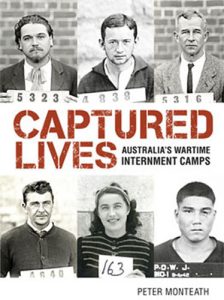
Peter Monteath, Captured Lives. Australia’s Wartime Internment Camp. NLA Publishing, undated ISBN 9780642279248.
The Hay Historical Society has compiled 200 pages of material on the three internment camps in this town in the state of New South Wales, 500 kilometres north of Melbourne. In addition to a wealth of interesting information on the history of the camp, it contains short biographies of interned artists as well as extracts from interviews with participants of the 1990 Dunera Reunion and contemporary witnesses from the town.
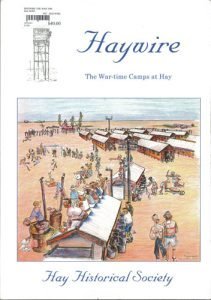
Hay Historical Society. Haywire. The War-time Camps at Hay. Neuauflage 2014. ISBN 0 9577610.
In the first half of 1940, Kitchener Camp in southern England was a transit camp, primarily for up to 4,000 Jewish men from Germany and Austria, who were offered asylum in England until they could continue their journey to a third country. In Four Thousand Lives, Clare Ungerson describes the brief history of the camp, which was set up on the wasteland of an unused military camp and financed entirely by donations from the British population. Ungerson gives a broad account of the background to the British government’s decision to make the site available and looks at the development and everyday life there.
The camp was soon closed because the fear of a Nazi “fifth column” led to the internment of tens of thousands of refugees. In addition, the British military demanded the return of the site, which had been made usable without any personal contribution.

Clare Ungerson, Four Thousand Lives. The Rescue of German Jewish Men to Britain, 1939. The History Press, 2014 and 2019. ISBN 978 0 7509 9235 0.
A first-hand resource book on the British deportations to Canada. For Eric Koch, author of Deemed Suspect. A Wartime Blunder, was himself one of the deportees. Only later did he summarise his memories and many documents to describe the situation that the internees faced when their freedom was taken from them in England and the British shipped them to Canada against their will. His account of the history of the four ship transports, of which the Arandora Star did not reach its destination, also relates the experiences of the more than 2,000 refugees who were deported to Australia on the fifth ship, the Dunera.
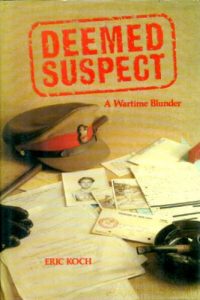
Eric Koch, Deemed Suspect. A Wartime Blunder. Canada 1980, ISBN 0-458-94490-4.
At the end of 1938, the merchant Otto Silbermann experiences the unsubtle everyday life of the persecution of the Jews in Berlin. His business and home were taken from him. Written in 1939 by Ulrich Alexander Boschwitz (*1915), The Passenger is the deeply moving story of a disillusioned German Jew who has nothing left to do but observe the indifference of people on trains and in train stations. The Menschen neben dem Leben (People Next to the Life) in Boschwitz’s debut are victims of the economic crisis of the 1920s, who meet every evening in a Berlin pub and try to preserve their dignity. Both books were first published in Sweden in 1937 and 1939 respectively. It was not until 2018 that The Passenger was first printed in Germany.
Fleeing from the Nazis, Boschwitz and his mother came to England. He was interned there in 1940 as an enemy alien and deported to Australia with the Dunera. On the return journey, the unaccompanied MS Abosso was sunk by a German submarine on October 29, 1942. Among the 361 fatalities was Ulrich Alexander Boschwitz, who was only 27 years old.

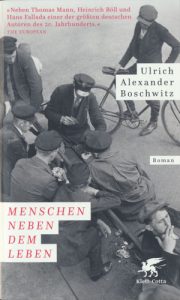
Ulrich Alexander Boschwitz, The Passenger. Pushkin Press 2021. ISBN 978-1782275381. Menschen neben dem Leben, Clett-Cotta, Stuttgart 2019. ISBN 978-3-608-96409-7.
World-famous for her novel „Aimée & Jaguar“ and its film adaptation, among other things, German-Austrian author Erica Fischer tells the true story of her parents Erich and Irka in Over the Ocean (Königskinder). As Austrian Jews, they were torn apart in British exile shortly after their marriage: Erich lives through the hellish voyage of the Dunera to Australia and the Hay desert camp. Irka survives the war in London. It takes a long time before they can make contact by letter and years before Irka and Erich are reunited. Erica Fischer uses the letters left behind to tell the story of this love.

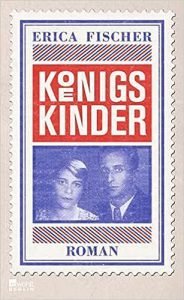
Erica Fischer, Over the Ocean, Hesperus Press, London 2014, ISBN 978-1843915041. Königskinder. Rowohlt, Berlin 2012. ISBN 978-3871347412.
Austria’s National Fund supports research into the life stories of Nazi victims. A three-volume cassette Exile in Australia, published as volume 5 of the book series Erinnerungen (Memories), contains 21 biographical reports on 1,000 pages. Among them is a text by Dunera Boy Heinz Altschul, who is pictured on one of the cover photos as a soldier in the 8th Employment Company.
There are also detailed accounts of artist families such as the Duldigs, who came to Australia from Vienna via Singapore and on the Queen Mary, in stories and testimonials. The book is written entirely in German and English and contains extensive illustrations.
More about the book series.

Renate S. Meissner/Nationalfonds (editor.), Erinnerungen Band 5 – Exil in Australien. Three-volume cassette, Wien 1918. ISBN 978-3-9504794-8-5.
The brothers Jobst, Rainer and Uwe Radok were able to flee East Prussia. Rainer, the youngest of the trio, begins his life story with the history of his Jewish family in Königsberg. He tells of their exile and describes how banal reasons led to their misclassification as Nazis by the British authorities, how the brothers survived the sinking of the Arandora Star and were shipped to Australia on the Dunera.
Survival (Von Königsberg nach Melbourne) is an authentic and moving account of the story of a Jewish family against the backdrop of the Holocaust and exile.

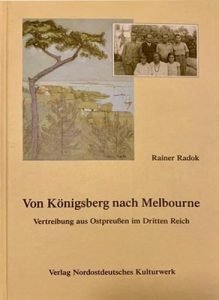
Rainer Radok, Survival, Bangkok 1992. Von Königsberg nach Melbourne, Institut Nordd. Kulturwerk, Lüneburg 1998, 185 pages, ISBN 393226715X.
Dunera Boy Richard W. Sonnenfeldt (1923 – 2009) titled his autobiography Witness to Nuremberg, He focuses on his experiences at the Nuremberg war crimes trials. As chief interpreter for the US prosecution, he had to translate the speeches of Nazi greats such as Hermann Göring, among others.
The doctor’s son was born in Berlin in 1923 and escaped to England with his younger brother Helmut in 1938. They were separated due to Richard’s internment. While Helmut was able to travel to the USA, Richard’s path led him to Australia on the Dunera. But after just a few days, he was sent back to England. He and 12 fellow exiles were embarked on the Dunera again. However, they were sent ashore in Bombay, from where Sonnenfeldt took a circuitous route to the USA. He returned to Germany as a US soldier and was ordered to attend the Nuremberg trials as chief interpreter for the US prosecutor. As an electrical engineer, he was later involved in the development of color television and NASA’s preparations for the moon landing, among other things. His biography in German is titled Mehr als ein Leben (More than a life).

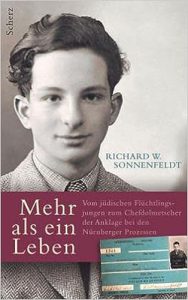
Richard W. Sonnenfeldt, Witness to Nuremberg. Arcade Publishing, New York 2002/2011, ISBN 978-1-61145-030-9. German Bio: Richard W. Sonnenfeldt, Mehr als ein Leben. Fischer Taschenbuch Verlag, Frankfurt/M 2005. ISBN 3-596-16415-X.
In several projects and books, the Berlin music historian Albrecht Dümling has focussed on the exile of Jewish musicians from Germany to Australia. In The Vanished Musicians (Die verschwundenen Musiker), Dümling revitalised this previously little-noticed topic with extensive research and findings from numerous interviews. The author places the jewish musicians among the Dunera Boys, such as Felix Werder and his father, the cantor Boas Bischofswerder, in an overall context of German-Australian music history.
His most recent publications include Mein Gorilla hat ‘ne Villa im Zoo. Here, Dümling researched the history of the Weintraubs Syncopaters and follows the tracks of this jazz band, which was well-known in Berlin in the 1920s, all the way to Australia.
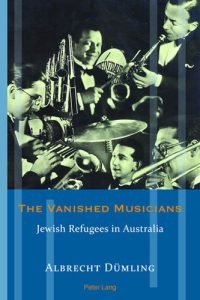
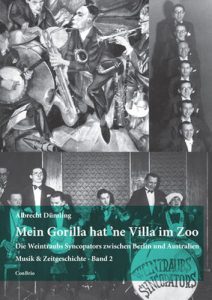
The Vanished Musicians, Verlag Peter Lang, 2016, ISBN
9783034319515. German books: Die verschwundenen Musiker. Köln 2011. ISBN 978-341206666. Mein Gorilla hat ‘ne Villa im Zoo. Regensburg 2022. ISBN 978-3949425-03-5.
As a teenager, Lutz Eichenbaum (1923 – 2010) escaped the persecution of Jews in Nuremberg on a Kindertransport to England and saw his parents for the last time in his life. This was followed by deportation on the Dunera, years behind Australian barbed wire and “voluntary” service in the 8th Australian Employment Company. After the war, he changed his name to Leslie Ernest Everett and became an Australian citizen. Not Welcome brings together Lutz’s diaries, files from the Australian National Archives and other materials to create a biography that is as exciting as it is authentic.

Sue Everett, Not Welcome: A Dunera Boy’s escape from Nazi oppression to eventual freedom in Australia, 2011, 272 pages (only as ebook).
Books in German language
Based on the estate of his father Paul, who was born in 1921, Thomas Friedländer writes about Paul’s life from his childhood in a Jewish orphanage, his escape to England on a Kindertransport, his deportation to Australia, and his military service there. It seems like a “typical Dunera biography,” but it is also atypical. Paul Friedländer — known in Dunera circles as “Bonzo” — had contact with the Jewish-Communist resistance group Herbert Baum in Berlin as a teenager. This shaped his life. Returning to East Berlin in 1947, he came under the scrutiny of the SED hardliners in the GDR – first as a suspicious Western exile, later as a critical analyst of Western policy toward Africa. An eye disease made his work and everyday life increasingly difficult. Depressed and blind, “Bonzo” took his own life in 1980.
Thomas Friedländer combines the account of his father with memories of shared experiences that shaped him, writing about his experiences in the GDR and after reunification. In another extensive section, he works his way from the history of his grandparents to the family trees and finds a family scattered all over the world as a result of Nazi persecution.
The publisher he chose was Edition Schwarzdruck, after Thomas learned that Arthur West had close ties to them. Born Arthur Rosenthal, the Austrian author was a Dunera Boy …

Thomas Friedländer, Bonzos Auge (Bonzo’s Eye), Edition Schwarzdruck, Gransee 2023, 400 pages, ISBN 978-3-96611-027-3, 27,00 €.7.
“The Whirling Reporter” Egon Erwin Kisch (1885-1948), journalist and communist, traveled to Australia at the end of 1934 to speak for Europe’s Nazi opponents at an anti-war congress. Australia’s government of the racist and pro-Nazi United Australia Party (UAP) wanted to prevent his entry at all costs, fearing an upsurge in left-wing opposition and trade unions. Kisch jumped off the ship in Melbourne, broke his leg and was ultimately able to enforce his right of residence in court. Persecuted by the government and protected by political friends, he traveled Australia and reported on the situation in the Nazi empire. The reportage book Australian Landfall was published first in 1937. It also contains articles in which Kisch combined experiences from his travels through Australia with historical information. He does this in stirring literary reportages and always from a trade union perspective. Even after some 90 years, Kischs double meaning “ Landfall” is worth reading and timeless.


Egon Erwin Kisch, Australian Landfall, was first published in English language by Secker & Warburg, London 1937.
In Die unfreiwillige Weltreise (The involuntary world trip), the writer Max Zimmering (1909 – 1973) recounts the escape of his young hero Manfred, who comes from a communist family in Dresden, from political and racist persecution by the fascists. He searches for his older brother, who is fighting for the Spanish Republic. Manfred finally reaches Australia via Prague and England: after the war, he returns to his home town of Dresden to help build an anti-fascist Germany. The book is influenced by Zimmering’s own experiences as a refugee from Nazi Germany and as a Dunera Boy.
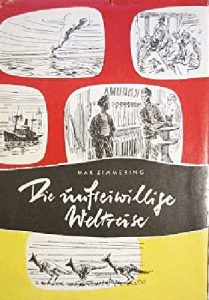
Max Zimmering, Die unfreiwillige Weltreise. Kinderbuchverlag, Berlin 1956 (first edition, subsequent editions in the GDR).
Walter Kaufmann (1924 – 2021) was one of the youngest Dunera Boys. Like around 900 comrades, he was released in 1945/46 after internment and army service and became an Australian citizen. He worked as a seaman and dock worker, among other things. Trade unionists encouraged his writing ambitions. His first novel, Voices In the Storm, in which he combined his own experiences in the Nazi state with a story of resistance was published in 1953. He later moved to the GDR, where he lived as a writer. In his short stories and narratives, published in German, he repeatedly refers to his experiences in British and Australian exile and reports on his encounters with contemporary witnesses. Here are just two examples.


Walter Kaufmann, Schade, dass du Jude bist. Dittrich, Berlin 2017, ISBN 978-3943941890. Die meine Wege kreuzten. Begegnungen aus neun Jahrzehnten. Quintus, Berlin 2018, ISBN 978-3-947215-24-9.
Letzte Monate in Wien (Last months in Vienna) describes Reinhold Eckfeld in a small but all the more gripping book. Eckfeld, a 16-year-old Viennese Jew at the time, recounts his experiences from „Kristallnacht“ to his departure from his homeland Austria at the end of 1938, describing the everyday life of Jewish people. They were exposed to attacks by their compatriots who, after the invasion of the neighbouring country by Hitler’s army, had turned into loyal Hitlerites and virulent anti-Semites. Reinhold Eckfeld describes many encounters and the bureaucratic harassment involved in obtaining the documents required for emigration. He describes with extraordinary and frightening accuracy the addresses, the appearance of office buildings, the prevailing moods, etc. In the end, Reinhold’s first escape route was to Switzerland, which was no less anti-Semitic. The rest of Reinhold’s life took him and his older brother Waldemar to Great Britain. There they were imprisoned as ‘enemy aliens’ and deported to Australia on the HMT Dunera in July 1940. In the internment camp, Reinhold wrote down his memories in German. Editor Martin Kirst supplemented the text with numerous photos and explanatory footnotes.
For the new edition of 2024 (cover right) entitled Reinhold Eckfelds Bericht – Vom Novemberpogrom bis zur Flucht aus Wien (Reinhold Eckfeld’s Report – From the November Pogrom to the Flight from Vienna, Martin Krist added new information and documents to the book.


Reinhold Eckfeld, Martin Krist (Hg.), Reinhold Eckfelds Bericht – Vom Novemberpogrom bis zur Flucht aus Wien. Theodor-Kramer-Gesellschaft, Wien, 2024, 108 Seite 18 €, ISBN 978-3-903522-24-4.
Reinhold Eckfeld, Letzte Monate in Wien, edited by Martin Krist. Turia+Kant, Wien 2002, ISBN 3-85132-312-2.
The book accompanying the Berlin exhibition of the same name, Ausgewiesen! Berlin, 28.10.1938. (Expelled! Berlin, 28 October 1938), contains extensive illustrations and documentation of the “Polenaktion”, when the Nazis deported thousands of Polish Jews to Poland at the end of October 1938. The volume’s focus on Berlin does not prevent from providing general and fundamental information on the history of the Jews during the Nazi era not only in the capital. The “Polenaktion” was ultimately an exercise in the organisation of the later mass deportations of Jews to ghettos, Auschwitz and other extermination camps.
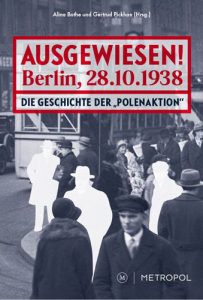
Alina Bothe/Gertrud Pickhan (hrg.), Ausgewiesen! Berlin, 28.10.1938. Metropol, Berlin 2018. ISBN 978-3-86331-411-8.
Richard W. Sonnenfeldt
entf
entf

entf.
entf.
entf
entf.

entf.
Archives, museums and institutions in Germany
Over the course of ten years of research, the authors of dunera.de contacted numerous archives and institutions and discovered helpful websites. They would like to thank the staff of the Federal Archives in Berlin and Freiburg and the State Archives of Berlin, Lower Saxony, Rhineland-Palatinate and the Brandenburg State Archives, as well as the City Archives of Hanover and Munich, among others, for their support. Digital resources from various institutions link the German Archives Portal and eat subject portals, including those on restitution and a newspaper portal. Numerous other museums and memorials offer information about the Holocaust and the Dunera. All logos are provided with links to the homepage of the respective institution – if available in English.
Archives, museums and institutions in other countries
The Yad Vashem memorial in Israel, with its extensive archive, is one of the most important resources on the fate of people in the Holocaust. The British Dunera Interest Group was only founded in 2023. The Kazerne Dossin Museum has an extensive collection of documents on the deportation of Jews from Belgium.


























































